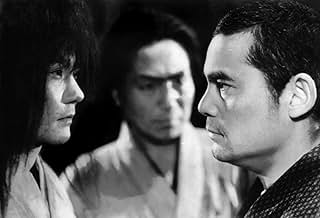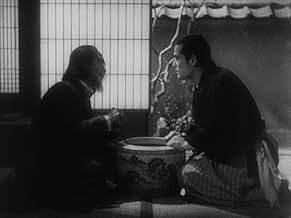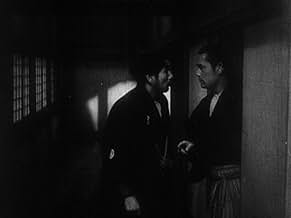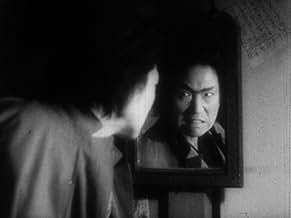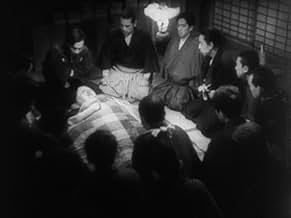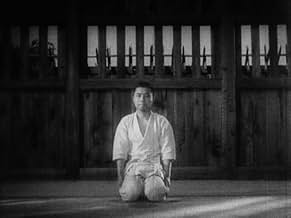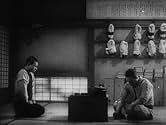Kô Ishida
- Daisuburo Hidarimonji
- (as Ko Ishida)
Osman Yusuf
- American Sailor
- (as Osman Yusef)
- Director
- Writers
- All cast & crew
- Production, box office & more at IMDbPro
6.03K
1
2
3
4
5
6
7
8
9
10
Featured reviews
Second Not Quite Up to the First
The martial arts are so dominant in Asian cultures. Kurosawa uses them in most of his films. This is the sequel to his first film, starring the same actor and character. It is rather talky. For some reason there are American sailors all over the place (I haven't had the time to investigate why so many were there in the time period shown). They have brought their great boxer, I suppose, to make them look idiotic, using fighting for profit rather than as a spiritual endeavor. Sugata is a folk hero and carries a lot of weight. When he sees a fellow martial arts expert beaten to a pulp, he feels he must do something to bring respect. Along the way, he becomes so famous (like a successful gunfighter) that the negative element wants a piece of him. There is just something lacking in this and is not the best Kurosawa (although he certainly was learning).
Where the way of the Martial Artist is paramount.
I saw the Kurosawa's first film, Sugata Sanshiro (1943), many years ago and was much impressed by the story and the spirit of martial arts, thus portrayed. It wasn't my introduction to Kurosawa, however, having already seen Seven Samurai (1954) and Yojimbo (1961).
Now, having seen the sequel to Sugata Sanshiro, one thing is certain: full appreciation for the story within the first film and this sequel is only possible, in my opinion, if you are, in fact, a practitioner of martial arts also which I am, and have been for thirty years. Note that I'm not excluding appreciation of Kurosawa's skill as a director; that's something that everyone can recognize and applaud. Even with these early films, Kurosawa's trademarks are clear: long silences, tightly framed sets where action moves across and around it, long close-ups of faces, objects and such like, much face-to-face dialog, and music that is generally muted.
This sequel is ostensibly about Japanese-American relationships in 1887, when Sugata is finally seduced into a match-up between himself and an American boxing champion. The film was made in 1945, soon after the Japanese surrender. Hence, the reason for that part of the story line is clear: even in the defeat of war, the Japanese martial spirit remains supreme. It is an understandable need on the part of Japan, and Kurosawa, at that time.
However, Kurosawa, and others involved no doubt, must have realized that there was a problem: the essence of martial arts is defense, not offense. So, it's entirely uncharacteristic for a true martial arts student to actively search out a contest that he knows has usually one outcome only: death for one of the competitors. Hence, Sugata must be shown as weak and indecisive at first so that he falls from grace, in his own eyes, when he defeats the American, who, fortunately, is not killed.
Sugata's salvation, however, as a true follower of the martial way, only comes when he meets the challenge of a karate champion in a fight to the death, during a winter storm on the side of a mountain. That fight scene is so realistic it's almost sublime: Kurosawa has captured exactly how two indomitable spirits stand and wait for the other to make the first move because the first mistake means death for one of them. Instead, the elements defeat both of them, with the karate master falling down a steep incline when Sugata tosses him over his shoulder. Honor for both, however, is assuaged: they spend the night in a hut together, where both recover from their efforts while the karate master's brother keeps watch.
There's a crucial sub-plot with that brother that I'll leave you to discover because it's a turning point in Sugata's life that actually saves him from death. See this and you'll know why. And savor that final scene when Sugata wakes from his sleep to face a new day and, for him, a new beginning as a judo ka (judo student) and as human being. It's pure Kurosawa as only he could do...
My only puzzlement with this story is the presence of karate students and practitioners in Japan in the 19th century. From the history I've read, karate was introduced into Japan only in 1922 when Funakoshi Gichin of Okinawa was invited to provide a demonstration in Tokyo. However, I'll bow to Kurosawa's better knowledge about his own country and society.
If you practice martial arts, you should enjoy this film. If you're curious, I'd recommend you try to see both.
Now, having seen the sequel to Sugata Sanshiro, one thing is certain: full appreciation for the story within the first film and this sequel is only possible, in my opinion, if you are, in fact, a practitioner of martial arts also which I am, and have been for thirty years. Note that I'm not excluding appreciation of Kurosawa's skill as a director; that's something that everyone can recognize and applaud. Even with these early films, Kurosawa's trademarks are clear: long silences, tightly framed sets where action moves across and around it, long close-ups of faces, objects and such like, much face-to-face dialog, and music that is generally muted.
This sequel is ostensibly about Japanese-American relationships in 1887, when Sugata is finally seduced into a match-up between himself and an American boxing champion. The film was made in 1945, soon after the Japanese surrender. Hence, the reason for that part of the story line is clear: even in the defeat of war, the Japanese martial spirit remains supreme. It is an understandable need on the part of Japan, and Kurosawa, at that time.
However, Kurosawa, and others involved no doubt, must have realized that there was a problem: the essence of martial arts is defense, not offense. So, it's entirely uncharacteristic for a true martial arts student to actively search out a contest that he knows has usually one outcome only: death for one of the competitors. Hence, Sugata must be shown as weak and indecisive at first so that he falls from grace, in his own eyes, when he defeats the American, who, fortunately, is not killed.
Sugata's salvation, however, as a true follower of the martial way, only comes when he meets the challenge of a karate champion in a fight to the death, during a winter storm on the side of a mountain. That fight scene is so realistic it's almost sublime: Kurosawa has captured exactly how two indomitable spirits stand and wait for the other to make the first move because the first mistake means death for one of them. Instead, the elements defeat both of them, with the karate master falling down a steep incline when Sugata tosses him over his shoulder. Honor for both, however, is assuaged: they spend the night in a hut together, where both recover from their efforts while the karate master's brother keeps watch.
There's a crucial sub-plot with that brother that I'll leave you to discover because it's a turning point in Sugata's life that actually saves him from death. See this and you'll know why. And savor that final scene when Sugata wakes from his sleep to face a new day and, for him, a new beginning as a judo ka (judo student) and as human being. It's pure Kurosawa as only he could do...
My only puzzlement with this story is the presence of karate students and practitioners in Japan in the 19th century. From the history I've read, karate was introduced into Japan only in 1922 when Funakoshi Gichin of Okinawa was invited to provide a demonstration in Tokyo. However, I'll bow to Kurosawa's better knowledge about his own country and society.
If you practice martial arts, you should enjoy this film. If you're curious, I'd recommend you try to see both.
2.14.2024
Akira Kurosawa's third film, released a year after The Most Beautiful (which he made for his wife) (actually, if it weren't for the lousy search function of Douban, there'd be no need to repeat this sort of objective reality in a review).
Akira Kurosawa himself, in his autobiography "Toad's Oil", doesn't seem to recognize much of the cinematic value of this "sequel to Zizan Sanshiro", which coincides with the popular aesthetic, the biggest criticism being the lyrical patriotism, similar to that in the modern-day Ip Man, an element that was loathed in the movies 60 years ago, and is still the case 60 years later. It's just obvious that the director, who has influenced Western cinema many times over in terms of casting and dramatization, naturally has his own insights. In the "Zi San Shiro sequel" will rarely see so involved, Kurosawa has shot, so low mobilization of nerves of film and television subject matter, at this point, I think the domestic film and television industry is still worth looking back at history to learn.
But the master is a master, after all, in the "Zi San Shiro sequel" we did not see colorful on that bad bridge too much continuation, but is point to the end, in the end oriented to the benevolence of the evil of revenge on the ending. It's as if when countless critics were giddy as if they were watching this talented Japanese director have some cracks in him, Akira Kurosawa once again backtracked on the theme of human kindness so that his early style wouldn't be so clearly labeled as patriotic.
Even now, as a director who has just made two movies, in his early work has revealed extremely artistic light and composition, in dealing with multiple people standing, not only makes people wonder if Antonioni has come here to steal the division.
Akira Kurosawa himself, in his autobiography "Toad's Oil", doesn't seem to recognize much of the cinematic value of this "sequel to Zizan Sanshiro", which coincides with the popular aesthetic, the biggest criticism being the lyrical patriotism, similar to that in the modern-day Ip Man, an element that was loathed in the movies 60 years ago, and is still the case 60 years later. It's just obvious that the director, who has influenced Western cinema many times over in terms of casting and dramatization, naturally has his own insights. In the "Zi San Shiro sequel" will rarely see so involved, Kurosawa has shot, so low mobilization of nerves of film and television subject matter, at this point, I think the domestic film and television industry is still worth looking back at history to learn.
But the master is a master, after all, in the "Zi San Shiro sequel" we did not see colorful on that bad bridge too much continuation, but is point to the end, in the end oriented to the benevolence of the evil of revenge on the ending. It's as if when countless critics were giddy as if they were watching this talented Japanese director have some cracks in him, Akira Kurosawa once again backtracked on the theme of human kindness so that his early style wouldn't be so clearly labeled as patriotic.
Even now, as a director who has just made two movies, in his early work has revealed extremely artistic light and composition, in dealing with multiple people standing, not only makes people wonder if Antonioni has come here to steal the division.
Better Than First
Sanshiro Sugata 2 (1945)
** 1/2 (out of 4)
Kurosawa's sequel has Sugata (Susumu Fujita) still growing in the world of judo but outsiders are wanting to make the fighting style a sport and put it up against American boxing. This is a rather strange film but I do think it's better than the original just because of how out there it is. I've read that the government forced Kurosawa into making this and you can tell because that plays a part in the film. American boxing is really looked down upon and fighting as a sport is shown to be evil and this really translates to Kurosawa being unhappy as he was forced to make this just like the characters here are being forced to do something they see as morally wrong. Seeing the different fighting styles mixed up together was pretty fun as was the ending, which takes place during a snow storm. Fujita is a lot better here than he was in the previous film and really delivers a strong performance and makes his character quite memorable with the difficulties that he faces. The film's biggest problem comes in form of some rather choppy storytelling that has the film wonder off from its main goal way too many times and this is certainly true in the final fifteen-minutes before the final showdown. The low-budget nature of the film also shines through in a negative way but I'm sure the fans of the director will want to watch this at least once.
** 1/2 (out of 4)
Kurosawa's sequel has Sugata (Susumu Fujita) still growing in the world of judo but outsiders are wanting to make the fighting style a sport and put it up against American boxing. This is a rather strange film but I do think it's better than the original just because of how out there it is. I've read that the government forced Kurosawa into making this and you can tell because that plays a part in the film. American boxing is really looked down upon and fighting as a sport is shown to be evil and this really translates to Kurosawa being unhappy as he was forced to make this just like the characters here are being forced to do something they see as morally wrong. Seeing the different fighting styles mixed up together was pretty fun as was the ending, which takes place during a snow storm. Fujita is a lot better here than he was in the previous film and really delivers a strong performance and makes his character quite memorable with the difficulties that he faces. The film's biggest problem comes in form of some rather choppy storytelling that has the film wonder off from its main goal way too many times and this is certainly true in the final fifteen-minutes before the final showdown. The low-budget nature of the film also shines through in a negative way but I'm sure the fans of the director will want to watch this at least once.
Interesting rarity for Kurosawa buffs
Due to its anti-American content, this film was never released in the US. Released in late 1945, in the early days of the American occupation of Japan, the movie has a strong anti-American slant. One of the two parallel plots of the film involves the young judo hero, Chee, and his battle to preserve the sanctity of the Japanese arts against the encroaching, brutish influence of American boxing. Americans are portrayed as a bunch of creeps. Eventually, Chee vanquishes the American champion to the wild cheers of his countrymen. This is by far the most interesting material in the film.
The judo vs boxing plot runs alongside a more pedestrian story: Chee is challenged by the brother of the karate master he vanquished at the finale of the original film. This story is a virtual carbon copy of the original, but with few of the original's charming nuances. The climactic final battle -- which takes place on a snow-covered moutainside -- is a pale imitation of the original's finale, which took place in a field of high grass.
The film also suffers from some of the same choppiness and fuzziness of narrative line that affected the original film, and a few other of Kurosawa's early works. Still, it's an entertaining effort. And it's remarkable as one of only two sequels Kurosawa ever filmed (the other being SANJURO, his follow-up to YOJIMBO). It appears Kurosawa learned from the experience of making SSP2 -- SANJURO is much more different from YOJIMBO than SSP2 is from its original, and a far more effective film than SSP2.
The judo vs boxing plot runs alongside a more pedestrian story: Chee is challenged by the brother of the karate master he vanquished at the finale of the original film. This story is a virtual carbon copy of the original, but with few of the original's charming nuances. The climactic final battle -- which takes place on a snow-covered moutainside -- is a pale imitation of the original's finale, which took place in a field of high grass.
The film also suffers from some of the same choppiness and fuzziness of narrative line that affected the original film, and a few other of Kurosawa's early works. Still, it's an entertaining effort. And it's remarkable as one of only two sequels Kurosawa ever filmed (the other being SANJURO, his follow-up to YOJIMBO). It appears Kurosawa learned from the experience of making SSP2 -- SANJURO is much more different from YOJIMBO than SSP2 is from its original, and a far more effective film than SSP2.
Did you know
- TriviaThe final fight scene was filmed outdoors in real snow. Susumu Fujita, fighting barefoot, had to be carried to a bonfire between each shot as his feet would go numb.
- ConnectionsFollows Sanshiro Sugata (1943)
- How long is Sanshiro Sugata, Part Two?Powered by Alexa
Details
- Release date
- Country of origin
- Language
- Also known as
- Judo Saga II
- Filming locations
- Toho Studios, Tokyo, Japan(Studio)
- Production company
- See more company credits at IMDbPro
- Runtime
- 1h 23m(83 min)
- Color
- Sound mix
- Aspect ratio
- 1.37 : 1
Contribute to this page
Suggest an edit or add missing content

